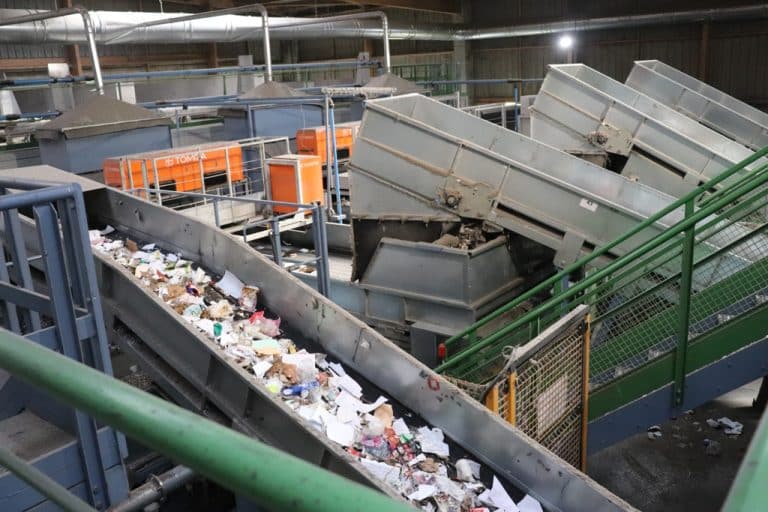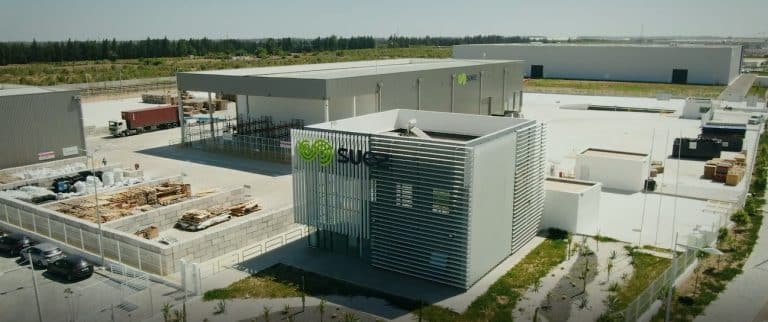Article produced in partnership with SUEZ

At the Limeil-Brévannes sorting centre in the south-east of the Val-de-Marne division, the ballet of tipper lorries is incessant. These vehicles, which collect waste from parts of the Paris region, supply the sorting centre, which operates 24 hours a day. Inside the building, the sorting belts are running at full speed. According to Nicolas Champeaux, the manager of this site operated by the SUEZ group, the equipment handles at least 60,000 tonnes of waste from selective collection and transfers bulky and industrial waste.
The system uses several technologies, including screening (trommel and ballistic screens), magnetic separators for recovering metals, and optical separators for sorting plastics and paper and cardboard. SUEZ is also turning to artificial intelligence (AI) with a view to “separating materials ever more finely”. The Group has developed “Autodiag”. This device, installed at the Limeil-Brévannes sorting centre, measures the quality of the materials produced in real time and on a continuous basis.
The system consists of an arch equipped with a camera placed directly on the sorting table. “Autodiag” measures the quality of waste grouping. This is done using algorithms, fed with labelled images of the different types of waste, which calculate the purity and homogeneity of the different qualities of materials produced.

With this tool, our management is much more precise, since we can control the quality of our production in real time”, explains Éric Buchard, team leader at Limeil-Brévannes, one of the first sorting centres to benefit from this new technology. “With a tool capable of giving us trends, we can also take action on the distribution of staff, their training, and also the adjustment of the mechanised process (speed of rotation of the belts or the adjustment of the machines)”, explains Nicolas Champeaux, site manager at Limeil-Brévannes.
According to him, Autodiag is now operational for plastic waste, with a success rate of around 98.5% in detecting incorrectly sorted waste. The Limeil-Brévannes sorting centre now handles the waste of almost 1.4 million people. An inspiring approach at a time when Africa is slowly but surely moving towards waste recovery.
At present, 70% to 80% of solid waste generated on the continent is recyclable, but only 4% of solid waste is currently recycled, according to the United Nations Human Settlements Programme (UN-Habitat). In 2016, sub-Saharan Africa generated 174 million tonnes of waste, at a rate of 0.46 kilograms per capita per day. The continent is expected to produce three times as much waste by 2050, according to the World Bank in a report published in 2018. The challenge is therefore immense.
Morocco is a fine example of a country that is putting in place solutions for sustainable waste management. In the north of the Kingdom, SUEZ is implementing its Evalix™ process, which enables sustainable management of the Meknes green landfill and recovery centre. In practical terms, this process dries concentrated effluent using the heat from the combustion of biogas.
Evalix™ complements the existing leachate treatment plant, which comprises an ultrafiltration membrane bioreactor, followed by reverse osmosis filtration. This new equipment is supplied with biogas via a collection network installed in the landfill area. This network not only collects the gas emissions that are used by Evalix™, but also prevents them from escaping into the atmosphere, thereby protecting the surrounding environment. In addition, the treatment guarantees a quality of treatment that complies with discharge into the natural environment, while producing water from the leachate that can be used for irrigation.
SUEZ is a pioneer in Morocco in implementing solutions for its industrial customers by focusing on industrial waste treatment platforms.
The Bouskoura platform (7,000 m²) will be joined in 2019 by two new facilities in the free zones of Tangiers (24,000 m²) and Kénitra (7,000 m²).
These multimodal platforms provide collection, sorting and pre-treatment solutions for waste generated by industry. With a capacity of over 100,000 tonnes a year, they can handle all types of waste: cardboard and paper, plastic, wood, ferrous and non-ferrous metals, and Special Industrial Waste.

The AFZ platform, for example, achieves a recovery rate of 93%, a major gain for manufacturers in reducing their environmental footprint.
It has a cable processing unit that crushes and separates non-ferrous metals from plastics, enabling shorter supply chains and a truly circular economy. With a cable processing capacity of 5,000 tonnes a year, the innovative system in place means that waste can be recycled, significantly reducing the company’s carbon footprint.
Article produced in partnership with SUEZ
